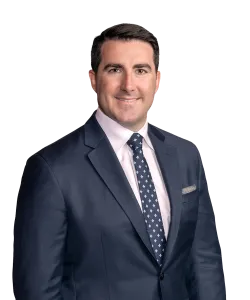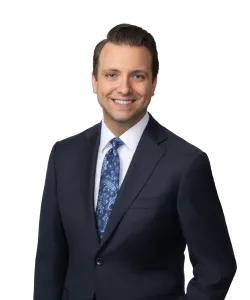DOJ Files Brief in Johnson & Johnson’s Appeal of $1.6 Billion FCA Verdict
Headlines that Matter for Companies and Executives in Regulated Industries
DOJ Files Brief in Johnson & Johnson’s Appeal of $1.6 Billion FCA Verdict
On August 27, the US Department of Justice (DOJ) filed a brief with the US Court of Appeals for the Third Circuit, supporting aspects of Johnson & Johnson’s (J&J) appeal of a $1.6 billion False Claims Act (FCA) verdict related to the marketing of HIV drugs, while also rejecting constitutional arguments made by J&J. We previously covered J&J’s appeal of the FCA verdict here. The case has gained widespread attention due to the size of the verdict and the potential impact on FCA enforcement.
The DOJ’s intervention, while neutral regarding the verdict, raises critical constitutional questions on the trial court’s jury instructions, post-trial rulings, and the broader application of the FCA in the pharmaceutical sector.
The underlying case involves allegations that J&J and its Janssen Products LP unit unlawfully promoted HIV drugs, resulting in a record FCA judgment comprising $360 million in damages and nearly $1.3 billion in penalties. The whistleblowers, former Janssen sales representatives, alleged that the company’s marketing practices led to the submission of false claims for federal health care reimbursement.
Key Issues Raised by the DOJ
- Constitutional Challenges to the FCA: The appeal also raises constitutional challenges to the FCA’s qui tam provisions, which allow private whistleblowers to bring actions on behalf of the government. The DOJ defended the constitutionality of these provisions, asserting that whistleblowers do not exercise executive authority and that the government retains control over FCA litigation. The DOJ also rejected arguments that the $1.6 billion penalty violates the Eighth Amendment’s prohibition on excessive fines, stating that the penalty is proportionate to the gravity of the alleged misconduct.
- Post-Trial Rulings and Misbranding: The DOJ further argued that the district court’s post-trial opinion incorrectly suggested that off-label marketing alone renders claims false under the FCA. The DOJ emphasized that misbranding governs marketing practices, not reimbursement eligibility, and that off-label promotion does not automatically violate an express condition of payment under federal health care programs.
- Jury Instructions and Drug Reimbursement Criteria: The DOJ’s brief contends that the district court erred in its jury instructions by conflating US Food and Drug Administration (FDA) approval with federal health care program reimbursement eligibility. The court instructed jurors that Medicare covers FDA-approved drugs and drugs that are listed in medical compendia, but the DOJ clarified that reimbursement could extend to off-label uses of FDA-approved drugs. The DOJ noted that Janssen may have forfeited its challenge to the instructions by not objecting at trial and recommended that a new trial should only be ordered if the error was “highly prejudicial.”
The DOJ’s brief, while not taking a position on the sufficiency of the evidence, urges the Third Circuit to vacate the judgment and remand for reconsideration under a correct interpretation of the law if a new trial is deemed unnecessary.
The case is US ex rel. Penelow et al. v. Janssen Products LP, No. 25-1818 (3d Cir.).
CVS Agrees to Pay $12.25 Million Settlement Over MassHealth Drug Pricing Allegations
On August 27, CVS Pharmacy, Inc. agreed to pay $12.25 million to resolve the Massachusetts Attorney General’s allegation that it failed to comply with MassHealth prescription drug pricing regulations by overcharging the state’s Medicaid program. The settlement addresses claims that CVS did not provide MassHealth with the lowest available drug prices, as required by state regulations, and instead offered lower prices to cash-paying customers through discount programs without reporting those prices to MassHealth.
The Massachusetts Attorney General’s Office alleged that CVS violated Massachusetts’ “Most Favored Nation” drug pricing regulation, which requires pharmacies to charge MassHealth the lowest price offered to any other customer. CVS contracted with ScriptSave to administer discount card programs. These programs often resulted in cash-paying customers receiving lower prices than those billed to MassHealth, particularly for generic drugs. Moreover, CVS’ methodology for submitting drug pricing data allegedly avoided reporting these lower prices to MassHealth.
Under the terms of the settlement, CVS will pay $12.25 million to MassHealth and implement an annual reconciliation process to review and ensure accurate prescription drug pricing for MassHealth members going forward. This process is intended to prevent future overcharges and ensure compliance with state pricing regulations.
The settlement follows an April lawsuit filed by the Massachusetts Attorney General’s Office, in coordination with the attorneys general of Connecticut, Indiana, and Oklahoma, and stems from a whistleblower action in federal court. As part of the civil settlement, CVS did not admit any wrongdoing or liability regarding the government’s allegations.
The Massachusetts’ Attorney General’s press release is available here.
US Attorney’s Office in Chicago Launches New Health Care Fraud Section
On August 22, the United States Attorney’s Office for the Northern District of Illinois announced the creation of the Health Care Fraud Section. The newly created section will consist of six federal prosecutors, headed by inaugural Section Chief Heidi Manschreck and Deputy Chief Prashant Kolluri.
In line with the DOJ’s enforcement priorities (which we previously covered here), the Health Care Fraud Section will be dedicated to the prosecution of health care fraud, including false and fraudulent insurance claims, upcoding and unbundling schemes, Medicare and Medicaid scams, fraudulent billing, and illegal kickbacks.
The section announced its work will add to the ongoing efforts of the Health Care Fraud Strike Force, which is part of the Fraud Section of the DOJ’s Criminal Division. The new section will further coordinate with the DOJ’s Health Care Fraud Unit which has undertaken prosecution of nationwide health care fraud enforcement actions. Acting Assistant Attorney General Matthew Galeotti of the DOJ’s Criminal Division emphasized that the Health Care Fraud Unit is “focusing on corporate enforcement in the health care space” as part of its nationwide efforts.
Read the United States Attorney’s Office for the Northern District of Illinois’ press release here.
Brooklyn Cardiologist Sentenced to 37 Months in Prison for Health Care Fraud
On August 21, Dr. Niranjan Mittal, a Brooklyn, New York-based cardiologist, was sentenced to 37 months in prison for his role in a years-long arrangement that paid physicians for patient referrals and defrauded insurers of over $40 million. In addition to the 37-month prison term, Mittal was sentenced to two years of supervised release and ordered to forfeit proceeds traceable to the offense.
Mittal pled guilty to one count of violating the Anti-Kickback Statute in February. According to statements made to the court during a plea hearing, Mittal operated a medical clinic in Brooklyn providing vascular and cardiology medical treatments. He leased office space from various internists and general family practices throughout the city in order to receive patient referrals. Mittal often paid rental payments to the providers that were unrelated to the fees set forth in the lease agreements to induce additional, new patient referrals. Between 2016 and 2023, insurers, including Medicare and Medicaid, paid over $40 million to Mittal’s practice for claims associated with patients improperly referred by providers receiving rental payments from Mittal.
The government alleged in other dismissed charges that Mittal’s medical practice would subject patients to a series of diagnostic tests and follow-up visits that were not medically necessary. Mittall and his staff, acting at his direction, allegedly fabricated patient records to justify unnecessary vascular procedures, including repeated surgical interventions. According to the allegations, some patients underwent 10 or more procedures over the several years without any improvement.
Read the United States Attorney’s Office for the Southern District of New York’s press release here.
California Behavioral Medicine Provider Agrees to Pay $2.75 Million to Resolve FCA Allegations for Psychotherapy Services
On August 19, American Psychiatric Centers, Inc., doing business as Comprehensive Psychiatric Services (CPS), agreed to pay $2.75 million to resolve allegations that it violated the FCA by submitting false claims to government health care payors for psychotherapy services. CPS, based in Walnut Creek, California, provides behavioral medicine services to individuals and families throughout California.
The government alleged that, from January 1, 2015, through December 31, 2022, CPS and its providers improperly billed government payors using billing codes designated as “add-on” codes. These codes are intended for use when psychotherapy services are performed in conjunction with an evaluation and management visit and require specific supporting documentation. According to the settlement, CPS submitted claims using these codes in instances where the described services were either not provided or not sufficiently documented.
Under the terms of the settlement, CPS will pay $2,615,569.32 to the United States and $134,430.68 to the State of California. As part of the civil settlement, CPS did not admit any wrongdoing or liability.
Read the United States Attorney’s Office for the Northern District of California’s press release here.
Contacts
- Related Industries
- Related Practices







